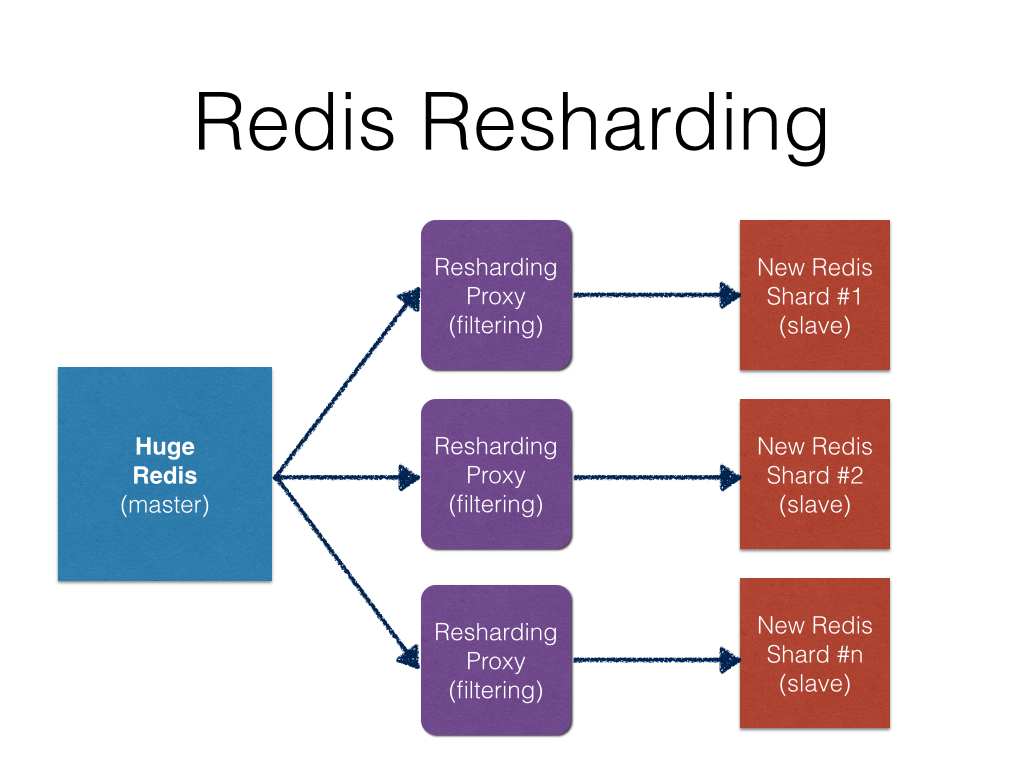

Redis Resharding Proxy could be used to split (re-shard) instance of Redis into several smaller instances without interrupting normal operations.
Resharding is using Redis built-in replication to transfer data from master Redis node (existing big node) to slave (new smaller node) through special proxy which filters keys in both initial data (RDB) and incremental updates in real-time.
For example, let's assume that keys in Redis are numeric ([0-9]+) distributed evenly. We would like to split it into two parts, so
that 50% of keys goes to first Redis and 50% to another one. So we would set up two redis resharding proxies, one with regular
expression ^[0-4].* and another one with ^[5-9].*. Both proxies would be using the same original master Redis as their upstream
master server. We would launch two new Redis instances, making them slaves of respective resharding proxies, replication would start
from master to two new slaves via proxy which would filter keys by regexps splitting original dataset into two halves.
Redis resharding proxy is written in Go and requires no dependencies.
If you have Go environment ready:
go get github.com/smira/redis-resharding-proxy
Otherwise install Go and set up environment:
$ mkdir $HOME/go $ export GOPATH=$HOME/go $ export PATH=$PATH:$GOPATH/bin
After that you can run redis-resharding-proxy.
redis-resharding-proxy accepts several options:
-master-host="localhost": Master Redis host -master-port=6379: Master Redis port -proxy-host="": Proxy listening interface, default is all interfaces -proxy-port=6380: Proxy port for listening
They are used to configure proxy's listening address (which is used in Redis slave to connect to) and master Redis address.
Regular expression is given as the only argument which controls which keys should pass through proxy:
redis-resharding-proxy --master-host=redis1.srv --proxy-port=5400 '^[a-e].*'
First, let's launch master Redis server:
redis-server --port 6400
And fill it with some data:
$ redis-cli -p 6400 redis 127.0.0.1:6400> set apple red OK redis 127.0.0.1:6400> set banana yellow OK redis 127.0.0.1:6400> set cucumber green OK redis 127.0.0.1:6400>
Then, let's launch slaves:
redis-server --port 6410 redis-server --port 6420
And resharding proxies:
redis-resharding-proxy -master-port=6400 -proxy-port=6401 '^a.*' redis-resharding-proxy -master-port=6400 -proxy-port=6402 '^b.*'
First proxy would pass only keys that start with a, second one only keys that start with b.
Then, let's start replication:
$ redis-cli -p 6410 redis 127.0.0.1:6410> slaveof localhost 6401 OK redis 127.0.0.1:6410>
And with another slave:
$ redis-cli -p 6420 redis 127.0.0.1:6420> slaveof localhost 6402 OK redis 127.0.0.1:6420>
You should see replication progress both in Redis output and resharding proxy log.
Now, we can verify that replication went well:
$ redis-cli -p 6410 redis 127.0.0.1:6410> get apple "red" redis 127.0.0.1:6410> get banana (nil)
And with another slave:
$ redis-cli -p 6420 redis 127.0.0.1:6420> get apple (nil) redis 127.0.0.1:6420> get banana "yellow"
Let's try to change key on master:
$ redis-cli -p 6400 redis 127.0.0.1:6400> set apple blue OK
The change would be propagated to slave:
$ redis-cli -p 6410 redis 127.0.0.1:6410> get apple "blue"
Now, replication could be switched off on slaves, master and proxies shut down. One Redis has been split into two Redises, one with keys starting with a and another one with keys starting with b.
Resharding proxy is filtering RDB approximately 50% slower than Redis itself is loading RDB into memory, so replication may take twice the time with proxy compared to direct Redis to Redis replication.
Resharding proxy should be compatible with any Redis version, it has been extensively tested with 2.6.16. When filtering live commands,
only commands which affect one key are supported (that's majority of Redis commands), e.g. SET, INCR, LPUSH, etc. Commands that affect
several keys may lead to unexpected results (like commands BITOP, SUNIONSTORE.)
I would like to say thanks for ideas and inspiration to Vasiliy Evseenko, Alexander Titov and Alexey Palazhchenko.
Copyright 2013 Andrey Smirnov. Unless otherwise noted, the source files are distributed under the MIT License found in the LICENSE file.
